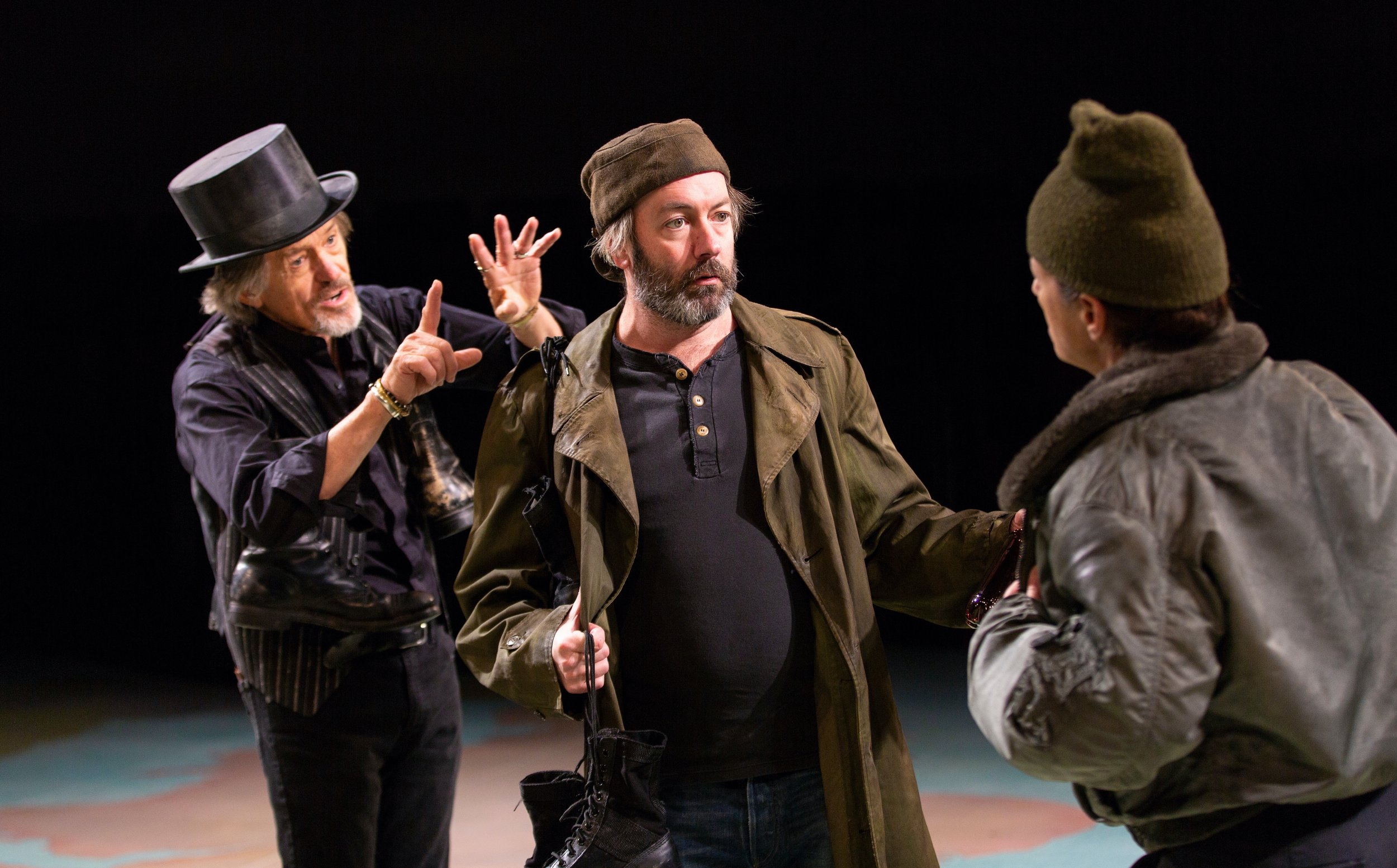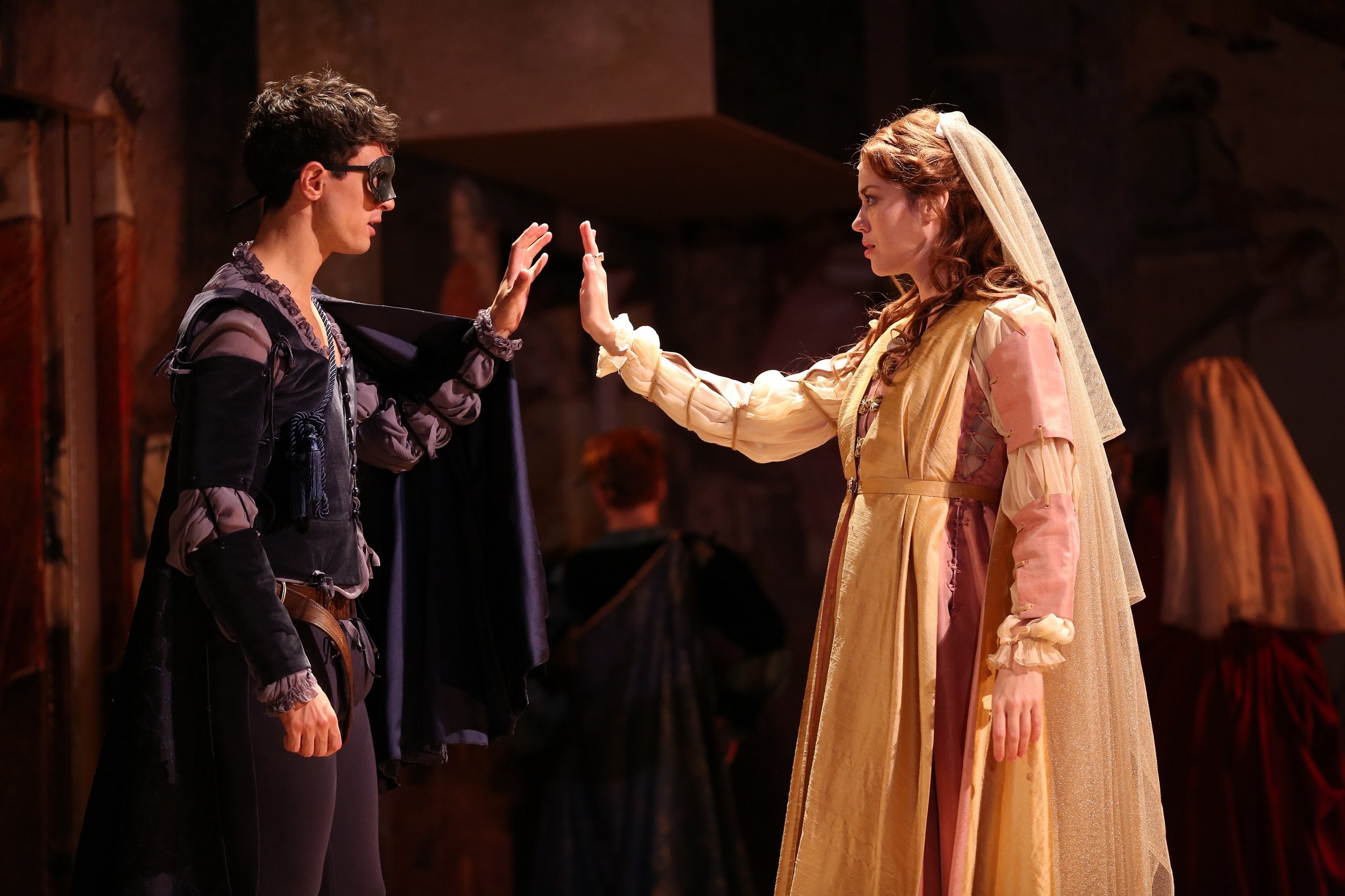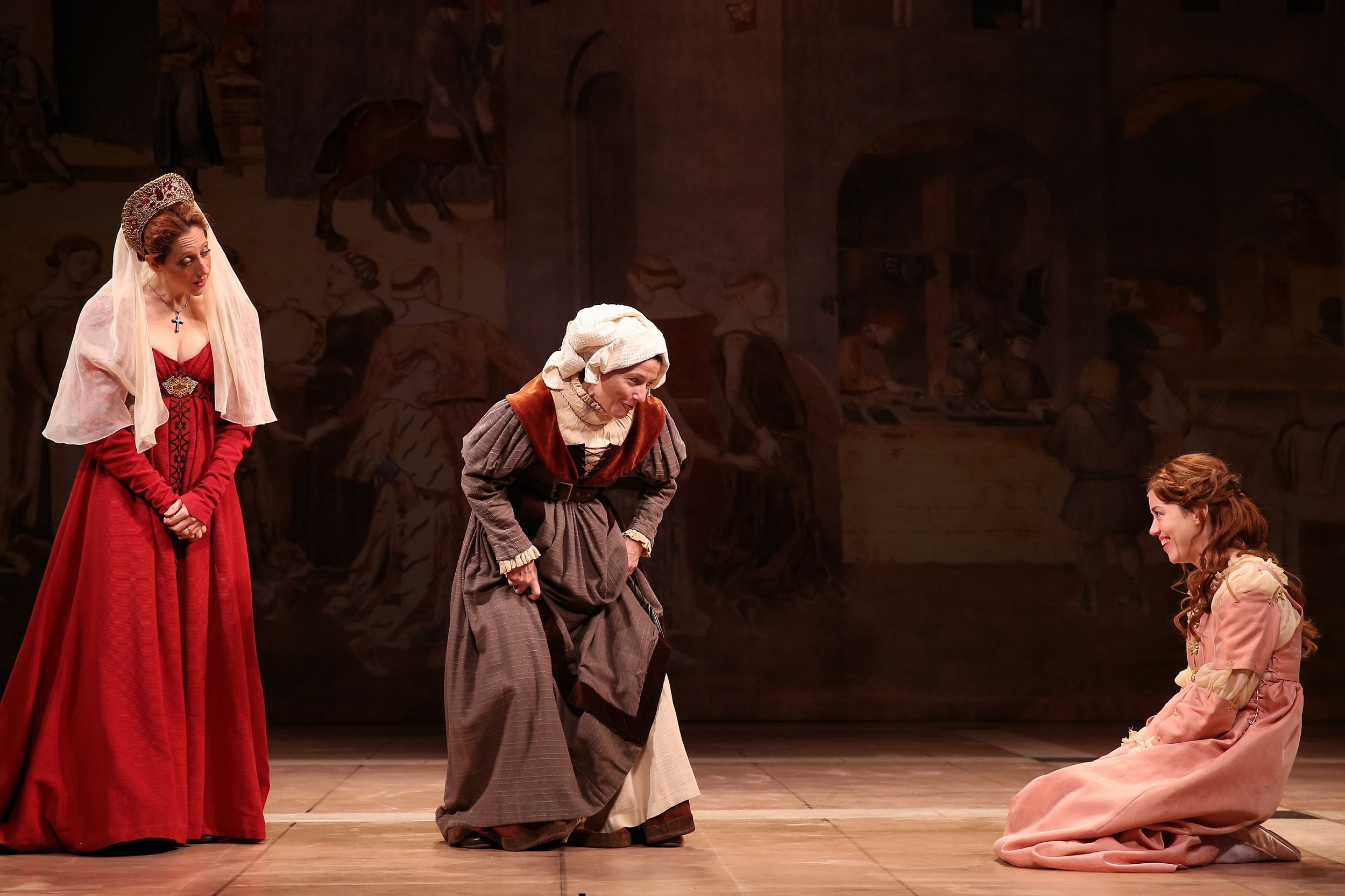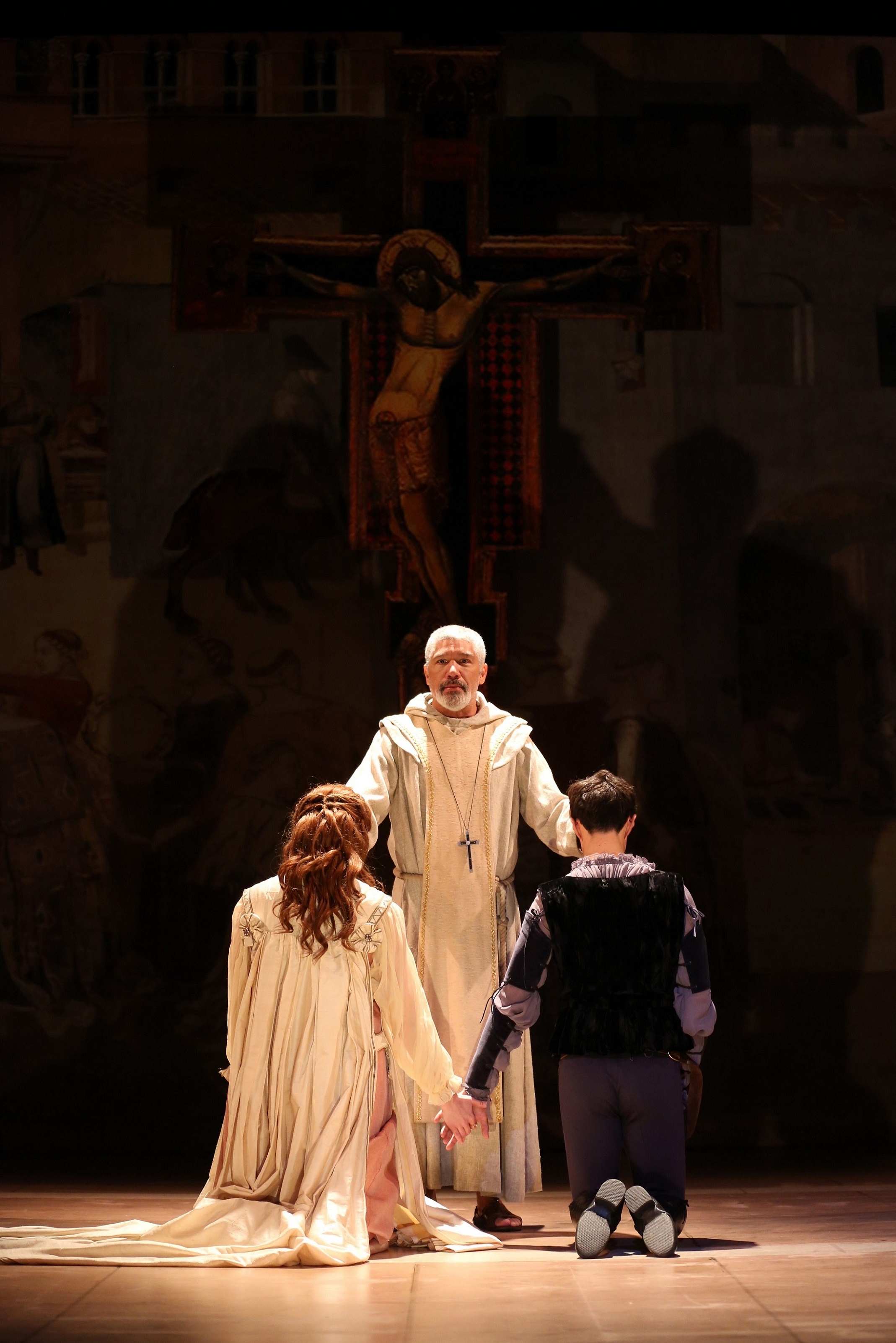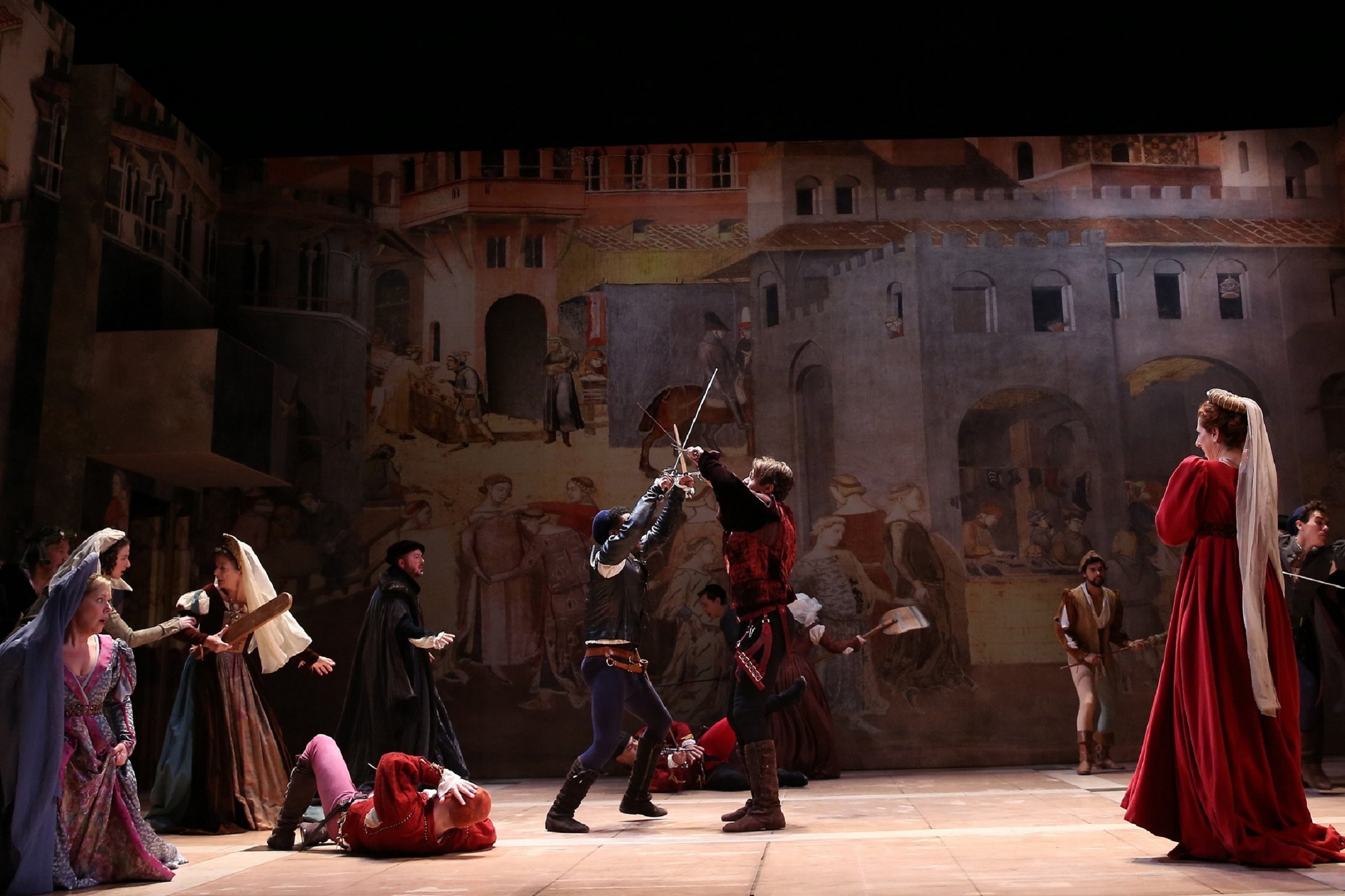Review of Henry V, Hartford Stage
A production in the round is unusual in current Connecticut theaters, and it’s unusual to see a Shakespeare production as stripped-down and bare bones as the version of Henry V now playing at Hartford Stage, directed by Associate Artistic Director Elizabeth Williamson. The choices make for an almost behind-the-scenes feel to this varied play.
Henry (Stephen Louis Grush), foreground, and the cast of Henry V at Hartford Stage (photos by T. Charles Erickson)
This is the third production Williamson has directed at the theater—following Caryl Churchill’s satiric Cloud 9 and an explosive Seder by Sarah Gancher—and she tends to go for edgy. Here, as with the Churchill play, the text requires many different tonalities to succeed fully. The cast—many playing multiple roles—delivers only some of them. The main tone is a very American address to a very British play, leaving the viewer in some doubt as to what and why.
Shakespeare’s play chronicles the effort of the newly crowned Henry V, formerly the dissolute rowdy Prince Hal, to wage war on France, driven by advisors who insist he has a claim to the French crown. Here, as Archbishop of Canterbury, Felicity Jones Latta plays up the comedy of the torturous detail by which the claim is justified without necessarily convincing anyone but Henry that there is a claim. He trusts it and so, at the start, we see a king driven by a prideful decision to prove himself, particularly when the scornful Dauphin of France (Anthony Michael Lopez) sends Henry a bunch of tennis balls as a message. Henry, in France’s view, is a total lightweight, and, while we might recall recent events in which two over-wielding political leaders exchanged taunts while the fate of the world hung in the balance, the exchange doesn’t land as definitive for the action to come. Are we to see Henry as a true king in the making (the general version of the character), or misguided, spoiled, or worse?
The Archbishop of Canterbury (Felicity Jones Latta), foreground, with King Henry (Stephen Louis Grush)
The problem lies mostly with Stephen Louis Grush’s interpretation of Henry. With his shaven head and forceful frame, we easily see him as a man of action. He speaks fast and with a diction better-suited to direct speech than iambic pentameter. His main vocal shift is irascible explosion, otherwise he rarely makes clear the emotions that guide Henry. He’s best when professing himself a soldier unable to woo properly, but that comes late. It may be that Williamson has chosen to downplay the big sentiments that are generally associated with the play, such as the rhetorical fire of the St. Crispin’s Day speech, and that choice makes Henry blend into the ensemble work on view here. The play tends to be more interesting when its titular character isn’t around.
Duke of Gloucester (Reid Williams), Henry V (Stephen Louis Grush)
The staging is empty of most scenic devices, except an occasional table and chair, and wide open, with many points of entry and exit. The floor of the playing space is a map showing the British Isles in relation to mainland Europe. The costuming is a mix of fatigues and fancier uniforms that recall various armies, from the Great War onward. Suffice to say, it’s an eclectic look that does little to recall British history specifically, and the same is true of accents. One character—the truculent Pistol—is played by Miles Anderson with a British accent. As Captain Fluellen of Wales, Baron Vaughn speaks more sing-songy than do the others, which I suppose distinguishes him. A French prisoner, Monsieur Le Fer (Nafeesa Monroe) speaks English as a comic French-person would, and Katherine, the princess of France (Eveyln Spahr) speaks in French and broken English with her French-speaking maid Alice (Felicity Jones Latta). The scene between Alice and Katherine, like the wooing between Henry and Katherine, comes off well, made engaging by Spahr’s skill in romantic comedy.
Henry (Stephen Louis Grush), Katherine of France (Evelyn Spahr), Alice (Felicity Jones Latta)
At the heart of the play here, it seems, are the efforts to loot while at war on the part of Sir John Falstaff’s former companions, Nym (Felicity Jones Latta), Pistol (Miles Anderson), and Bardolph (Liam Craig). The description of Falstaff’s death, by Mistress Quickly (Baron Vaughn), is played for laughs with but scant pathos, and the scene in which Henry agrees to the death by hanging of one of his former cronies brings forward little of the shared past. Here, it’s easy to overlook why these three ne’er-do-wells are even part of the play, as their role in shadowing Henry’s grandiosity is rarely if ever made pointed. They are comic relief, of a sort, though Anderson’s Pistol emerges as the most dynamic character in the play. Bardolph, shorn of his oft-remarked inflamed nose and pustular visage, is good-looking enough to be mistaken for Captain Gower of England (whom Craig also plays). In a key scene Pistol argues for saving the absent Bardolph while Gower looks on. Keep your playbill handy or you may suspect that Gower is Bardolph in a different garment.
Pistol (Miles Anderson), Bardolph (Liam Craig), Nym (Felicity Jones Latta)
In the midst of the lackluster readings of several of the 34 characters enacted by 15 actors in this busy production is the welcome presence of Peter Francis James as the Chorus. Florid, commanding, with a sure sense of the sound and cadence—to say nothing of the vowels and consonants—of Shakespearean rhetoric, James delivers his too few speeches quite effectively. At certain points, I found myself wishing he would simply narrate the story, which would help us to follow the who’s who and what’s what of this complex and not so well-known Shakespearean plot.
Chorus (Peter Francis James)
Disappointing and quizzical, Hartford Stage’s Henry V succeeds at times, but its energy, like that of its hero, too often seems misdirected.
Henry V
By William Shakespeare
Directed by Elizabeth Williamson
Scenic Design: Nick Vaughan; Costume Design: Beth Goldenberg; Lighting Design: Stephen Strawbridge; Sound Design: Matt Hubbs; Original Music: Christian Frederickson; Fight Choreographer: Greg Webster; Dramaturg: Yan Chen; Production Stage Manager: Robyn M. Zalewski
Cast: Karen Aldridge, Miles Anderson, Liam Craig, Kate Forbes, Stephen Louis Grush, Peter Francis James, Felicity Jones Latta, Mark Lawrence, Anthony Michael Lopez, Nafeesa Monroe, Jamie Rezanour, Evelyn Spahr, Haley Tyson, Baron Vaughn, Reid Williams
Hartford Stage
October 11-November 11, 2018




